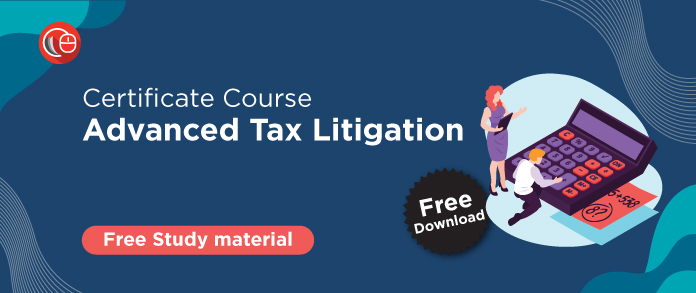- Congratulations on becoming a Partner at Saraf and Partners! What sparked your interest in this specialised area of law?
Many thanks for the wishes and would like to state that feels like a God-sent opportunity to be able to collaborate with great legal luminaires at Saraf and Partners.
The epiphany with respect to my penchant for tax as a subject was early in my formative years whilst I was pursuing my Chartered Accountancy course (following my father’s footsteps) wherein tax is a paramount subject and I particularly enjoyed dwelling into income tax owing to its complexity and interpretation being involved.
Even the great Eistein has been quoted to say “the hardest thing in the world to understand is income taxes” and I’m sure he wasn’t even talking about the Indian income tax statute. About the Indian Income Tax Act, interestingly, in a High Court decision, Judges have stated that if we have a look at the entire scheme of the Income Tax Act, we’ll learn that it is as complicated as complications could be.
Even at the time of seeking out mandatory articleship/internship under the CA course whilst I was able to get through larger firms based on my academics (being an All India Rank Holder in both the initial levels of CA (PE-I &PE-II)), I chose to learn the ins and outs of tax in a more extensive manner. So that’s how I finally entered into the tax domain and still learning and deciphering the dynamic tax statute with the zeal to provide the requisite handholding to clients.
- With your expertise as a Chartered Accountant and a CFA, how do you combine financial analysis and tax advisory to provide holistic solutions to clients?
The advice that one provides to their clients has to be plausible on the legal front but also should be aligned with the financial treatment that would be entailed in the books with respect to the transaction at hand.
Whilst it is a trite law that the financials are not conclusive with respect to the finality of the tax incidence, but the financials would definitely have a persuasive value towards the tax treatment since the financials amongst other things also reflect the intention of the parties. In fact, with the advent of the IND-AS, which are the new accounting standards premised on fair value accounting, the face of the financials has also undergone a drastic shift and deciphering the financials is a different ball game owing to the IND-AS induced notional adjustments and treatments. The financials and the tax reporting carried out by a client are the starting point for any tax controversy/litigation and thus the same should marry well with the tax advice based on the underlying commercial objectives.
Also, we are in an era where valuations are at the forefront and the tax authorities are screening valuations very closely. My learnings from such specialisations enable me to understand the workings of business models and valuations, along with the underlying assumptions based on which the same are formulated. The same has enabled me to handle M&A advisory assignments and advise/defend Clients with respect to transactions consummated by them. The endeavour is to keep learning and upgrading my multi-disciplinary skillsets to be better positioned to provide implementable value-adding advice and support to Clients from all dimensions.
- Can you tell us about your journey in the field of taxation and transaction advisory? Being associated with esteemed firms like Nangia Andersen LLP, Grant Thornton, Lakshmikumaran & Sridharan, and MPC Legal, what valuable lessons and experiences have you gained that you plan to bring to your role at Saraf and Partners?
Have been very blessed to be bestowed with very diverse areas of work and great mentors under whose tutelage got to work on complex and challenging assignments early on in my career. The journey has been unfolding to be even more interesting ever since. Handled a wide array of search and seizure matters (including ones involving foreign assets and bank accounts) and represented clients before the tax authorities and various fora for complex tax matters. Have done some bit of work around supporting tax compliances for Clients which helps one understand how the tax advice is put to paper in the tax filings which play a pivotal role.
The majority of my career has been dedicated to assisting clients on myriad transactions: conceptualising, evaluating and presenting avant-garde alternatives for consummating the desired transactions based on the underlying commercial objectives since the same involves a lot of brainstorming sessions.
Was part of the core Private Client Service development group in my earlier stints and have been advising various coveted clients for promoter-centric matters including, inter-alia, estate and succession planning.
My journey and learnings so far would enable me to provide support and value addition to the Clients at Saraf and Partners.
- With over a decade of experience, you must have encountered a diverse range of transactions. Could you share a particularly challenging or complex case you’ve handled and how you navigated through it successfully?
Have been involved in a host of transactional matters involving organization structure realignments through mergers/demergers, slump sale/exchange; share & asset deals and capital restructuring, pre-IPO/REIT structuring, ESOP and MSOP structuring, et al.
Each transaction is distinct from the last one and involves its own set of challenges and nuances in all spheres especially on the tax front.
In the recent past, had been approached by Clients for similarly aimed transactions following almost a trend-like pattern.
Owing to the perception and other potential risks with respect to some jurisdictions, we have been approached by Clients to assist them to re-jig their Hold Co. structure. During COVID Clients were reaching out to realign their group structure to avoid issues in the Indian context by virtue of any linkage to a particular jurisdiction(s). Such assignments were really extensive involving multiple jurisdictions and stakeholders.
Over the last few years, fast-growing start-ups and other entities have been actively pursuing the externalisation of their structures to expand their presence in the international landscape and in the process be able to facilitate overseas listing and garner more international clientele/funding. Such externalisation/ internationalisation assignments were fascinating since they involved inter-play of multiple laws and jurisdictions.
However, soon thereafter, we also witnessed a lot of reverse-flips wherein the Clients were keen to dismantle their externalised structures and redomicile their holding company in India owing to various factors(including the India Growth story everyone has been talking about Globally). Such assignments were even more intellectually stimulating and engaging to come up with newfangled alternatives for undoing the structure in an efficient manner.
My approach for every complex transactional assignment has been to break it down into steps and mapping the implications to key activities/steps to the transaction and then outline modalities of attaining the efficient alternative for facilitating the transaction.
- In the ever-evolving landscape of tax law, how do you stay up-to-date with the latest developments, and how do you ensure your clients receive the most accurate and up-to-date advice?

With the slew of amendments and/or updates that are being rolled out coupled with the host of judicial pronouncements that are doled out in the realm of Income tax, one needs to have more than just an inclination to go through tax and other literature.
My passion for the subject and zeal to do better drives me to keep myself updated and spend time on a daily basis to revisit the statute and the basic tenets of income tax which are sought to be altered through the amendments and being re-interpreted through new jurisprudence.
With this backdrop, a clear understanding of the facts involved and in-depth exhaustive research form the backbone of every deliverable/advice to ensure that the advice is plausible, well-reasoned and most importantly aligned with the underlying commercial and other key objectives. As trusted partners for the Clients, we need to be proactive and well-versed with the developments to provide holistic advice to facilitate decision-making and implementation.
- As the Tax practice at Saraf and Partners expands, how do you plan to mentor and develop junior associates, ensuring a strong talent pipeline for the future? Also, can you share some of your valuable insights for law students who are piqued by tax law and want to grow professionally and enhance their knowledge in tax law?
This is one big responsibility that one is entrusted with while assuming leadership positions to be able to inspire, nurture and guide new professionals on the block. The right guidance and instilling the right methodologies early on would go a long way in gearing up such young minds to be well-rounded tax attorneys in the future. Have developed and/or picked up things, which I to continue to implement even at Saraf and Partners for enhancing the collective wisdom and experience of the Team. We start our day by picking up a provision along with any relevant updates/cases to deliberate amongst ourselves and dwell deeper into the same. This is something even I look forward to since new thought-provoking interpretations and doubts for the same provisions usually germinate in the young minds which are not pre-dispositioned. To facilitate these discussions and as a small token, I give small tax acts to the young associates/interns which is something they can call their own and encourage them to familiarise themselves with the framework of the tax statute. The intention would be to mould aspiring tax attorneys to be better professionals and play a small role in their long lustrous careers ahead.
With respect to the tax field which is perceived to be a super specialised field of law, I get to hear that entrants are mostly reluctant to venture into this domain owing to various factors. For the ones who wish to take up tax, which commands perseverance, in my personal view dwelling on the interpretation of statutes would be a good starting point to be able to better appreciate the essence and interpretation of any law including a fiscal statute like income tax act. Other than this, it would be ideal to get into tax-centric internships and participate in discussions, moots, et al to understand the exact dynamics of tax subjects and practice thereof. In parallel, I keep reading and learning along the way like myself.
- Can you tell us about a challenging client situation you encountered in your previous practice, and how you handled it to maintain client satisfaction and trust?
Well, an interesting yet challenging one was one involving a marquee Real Estate Client and one of the land-owning companies within the Group had received compensation from the Government pursuant to a compulsory acquisition. The Client had approached us to understand the implications of upstreaming such compensation to the Group’s flagship entity.
The Client entire team was confident that the compensation received was taxable in the hands of the Group company and the Client wanted us to only focus on the modalities and implications of the dividend being paid by the Company to the Parent since there was a need for deployment of funds on an immediate basis.
We based on our zeal to provide a complete solution to the Client kept pushing for the underlying compulsory acquisition-related documents despite the Client’s reluctance and belief that the compensation would be taxable. We were finally able to get the underlying document from the Client and based on the same we were able to assail that the compensation was not exigible to income tax in the hands of the Group company. Further, to manage the timelines for the fund deployment, we sought to merge the Group entity into the flagship entity through a fast-track merger route.
The assignment was challenging since it required breaking through pre-conceived positions but what matters is that we were able to deliver on our commitment to the Client to provide implementable and efficient solutions in their best interest.
- Could you share an example of a tax issue on which you’ve successfully supported a client in the past and the strategies you employed to achieve a favourable outcome?
The IBC law, vis-à-vis, Income tax law interplay has been a very interesting space and has witnessed a lot of tax amendments and jurisprudence but the controversies around the same seem to be never-ending. In one such assignment, we were assisting a client (which was itself in the process of listing) in acquiring another listed entity through the CIRP route. The assignment involved intricacies and strategic decisions around corporate restructuring (consolidation of the targets with the clients, target group restructuring), target listing versus delisting, claims structuring and IBC acquisition tax efficiency.
The acquisition of an entity through IBC (especially a listed one) would entail its own nuances on the tax front including, inter-alia, preservation of available tax losses, implications emanating out of hair cuts/loan waiver, mitigating tax incidence by virtue of share issuance/transfers whilst aiming to attain the desired shareholding in the target and maintaining the public float mandate.
We were able to successfully support the client in strategizing the entire acquisition in an efficient manner and also garner the CoC and NCLT nod on their Resolution Plan to effectuate the acquisition.
- In your opinion, what are the key challenges and opportunities for businesses in relation to taxation in the current economic and regulatory landscape?
In the current Indian landscape, the intention of the legislators can be gathered from various amendments and introductions in the recent Finance Acts which is to deepen and widen the tax base or net in India. A similar exercise is also being carried out in the international tax landscape to ensure that the jurisdictions get their fair share of taxes.
In the Indian context, the same is being done since tax collections are what the exchequer needs to fuel India’s Growth story and direct taxes are the major contributor to the current overall scheme
One sort of interesting fact around this is that: Kautilya in his ‘Arthashstra’ had profoundly stated that kosh moolo dandah meaning treasury is the root of administration, which is and it even more important today. You will be surprised to find this on the face of the Income tax return’s acknowledgements(in the watermark) even today.
The challenges which stem from this is that the businesses and their stakeholders would need to keep themselves updated on the latest developments to be in a position to make more informed decisions to mitigate exposures and far-reaching consequences for genuine taxpayers. The opportunity that would arise from such a situation would be that the business should get experts involved at the inception/planning stage itself who would empower the stakeholders to make more informed and efficient decisions from a tax and regulatory perspective.
Students of Lawsikho courses regularly produce writing assignments and work on practical exercises as a part of their coursework and develop themselves in real-life practical skills.
LawSikho has created a telegram group for exchanging legal knowledge, referrals, and various opportunities. You can click on this link and join:
Follow us on Instagram and subscribe to our YouTube channel for more amazing legal content.
 Serato DJ Crack 2025Serato DJ PRO Crack
Serato DJ Crack 2025Serato DJ PRO Crack










 Allow notifications
Allow notifications


